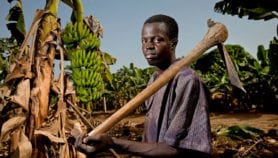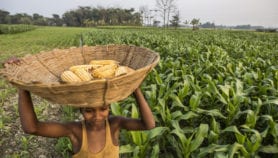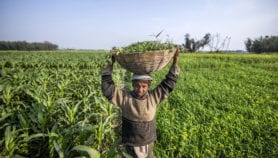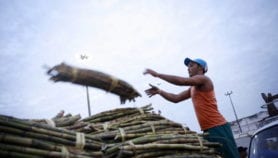By: Katie Mantell
Send to a friend
The details you provide on this page will not be used to send unsolicited email, and will not be sold to a 3rd party. See privacy policy.
A new US$2 billion natural gas pipeline from Bolivia to Brazil is threatening to wipe out one of the last remaining habitats for wild groundnut, scientists warned today (17 December).
These endangered stocks are a vital source of biodiversity that could help develop improved varieties of groundnut — an important source of protein and oil in many developing countries — they say.
Scientists had planned to collect samples of wild groundnut (or peanut) species before construction of the pipeline is completed. But their work has been delayed indefinitely because the Bolivian government has refused to authorise such collection following indigenous groups’ opposition to the pipeline project.
“Although the pipeline is bringing much-needed natural gas to Brazil, the stakes are high,” says David Williams, an ethnobotanist at the International Plant Genetic Resources Institute in Cali, Colombia. “The species we are looking for could eliminate much of the need for peanut farmers to use pesticides and also help them to cope with drought and disease.”
The pipeline, which runs through the Gran Chaco region of southeast Bolivia, has opened up remote areas to settlers and large-scale agriculture. “These are places where wild peanuts have survived undisturbed for thousands of years,” says Williams. Indigenous groups oppose the pipeline and, in their efforts to stop further encroachment, they have also ironically disrupted the collection of native plant species.
“The backlash from the pipeline controversy has inadvertently put pressure on the Bolivian government to withhold the permits that scientists need to remove wild peanut samples for safekeeping,” says Williams. “But we have strong support from Bolivia’s Ministry of the Environment and from the Bolivian scientific community who recognise what’s at stake if we don’t get in there in time and start collecting.”
If the ban is lifted, samples would be provided to Bolivian research organisations, the United States Department of Agriculture, and the world peanut collection at the International Crops Research Institute for the Semi-Arid Tropics (ICRISAT) based in Hyderbad, India, which houses nearly 15,000 different types of cultivated and wild peanuts.
Groundnut is one of the world’s most important food crops. But they are susceptible to many pests and diseases that can greatly reduce yields. Researchers think that over the centuries farmers and plant breeders have unintentionally “switched off” many useful genes that were present in early varieties of the crop.
“If we can put back into modern varieties some of the disease and drought-resistant genes from the ancient ancestors of groundnut, we should be able to give Asian and African farmers a helping hand,” says William Dar, director general of ICRISAT. “It’s an achievable goal, but will require us to move quickly before the native habitat of the crop’s ancestors is further altered.”
© SciDev.Net 2002
See also:
International Crops Research Institute for the Semi-Arid Tropics
International Plant Genetic Resources Institute 
Homepage













